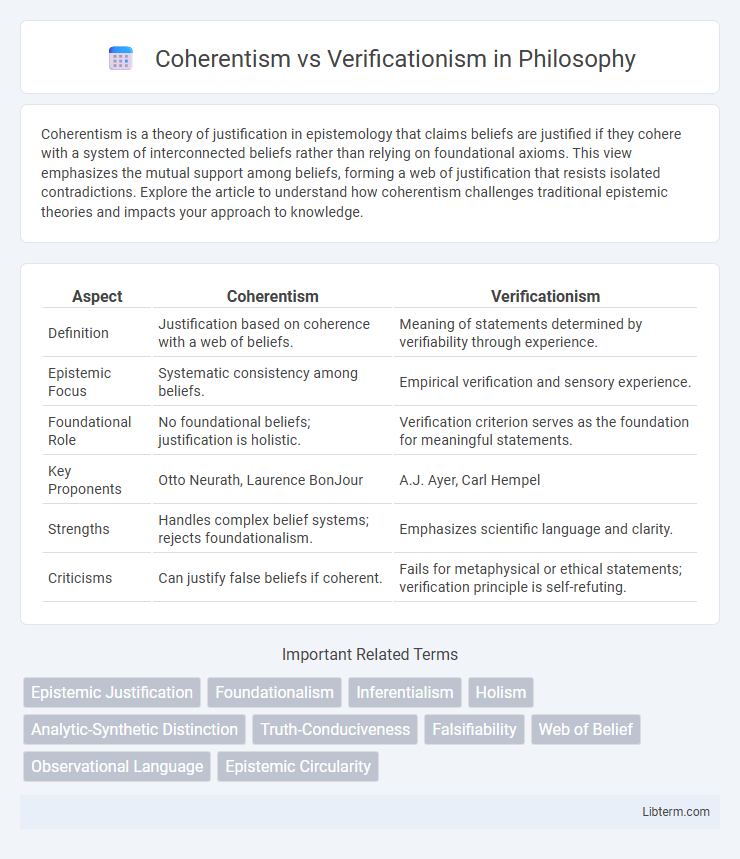Coherentism is a theory of justification in epistemology that claims beliefs are justified if they cohere with a system of interconnected beliefs rather than relying on foundational axioms. This view emphasizes the mutual support among beliefs, forming a web of justification that resists isolated contradictions. Explore the article to understand how coherentism challenges traditional epistemic theories and impacts your approach to knowledge.
Table of Comparison
| Aspect | Coherentism | Verificationism |
|---|---|---|
| Definition | Justification based on coherence with a web of beliefs. | Meaning of statements determined by verifiability through experience. |
| Epistemic Focus | Systematic consistency among beliefs. | Empirical verification and sensory experience. |
| Foundational Role | No foundational beliefs; justification is holistic. | Verification criterion serves as the foundation for meaningful statements. |
| Key Proponents | Otto Neurath, Laurence BonJour | A.J. Ayer, Carl Hempel |
| Strengths | Handles complex belief systems; rejects foundationalism. | Emphasizes scientific language and clarity. |
| Criticisms | Can justify false beliefs if coherent. | Fails for metaphysical or ethical statements; verification principle is self-refuting. |
Introduction to Epistemological Theories
Coherentism asserts that beliefs are justified when they form a consistent and mutually supportive system, emphasizing the holistic integration of knowledge. Verificationism, rooted in the logical positivist movement, holds that a statement is meaningful only if it can be empirically verified or is analytically true, prioritizing observable evidence. These epistemological theories contrast foundationalism by either rejecting isolated basic beliefs or demanding empirical confirmation for meaningful assertions.
Defining Coherentism: Foundations and Key Concepts
Coherentism defines justification through the mutual support and consistency among a system of beliefs rather than relying on foundational, self-evident truths. Central to Coherentism is the idea that beliefs form a web where epistemic justification derives from the coherence and logical integration of the entire belief network. Key concepts include the rejection of foundationalism, emphasis on holistic evaluation of belief systems, and the role of inferential relations to establish epistemic support.
The Core Principles of Verificationism
Verificationism emphasizes that a statement's meaning is grounded in its method of empirical verification, asserting that only propositions verifiable through sensory experience or logical analysis hold cognitive significance. This principle, rooted in logical positivism, rejects metaphysical claims as meaningless due to their unverifiability. Verificationism prioritizes empirical evidence and logical clarity as the foundation for meaningful discourse and knowledge validation.
Historical Development: Coherentism and Verificationism
Coherentism, rooted in the 19th-century idealist tradition and prominently advanced by philosophers like Brand Blanshard, emphasizes the mutual support of beliefs within a system for justification. Verificationism emerged in the early 20th century, largely shaped by the Vienna Circle, with figures such as Moritz Schlick and A.J. Ayer promoting the verification principle that meaningful statements must be empirically verifiable. Both frameworks arose as responses to skepticism and the quest for a foundation of knowledge, influencing epistemological debates throughout the 20th century.
Comparing Truth Criteria: Coherence vs. Verification
Coherentism defines truth through the consistency and mutual support among a set of beliefs, emphasizing the overall harmony within a belief system rather than isolated validations. Verificationism asserts that truth relies on empirical verification, meaning a statement must be directly testable or confirmable through sensory experience. The fundamental difference lies in coherentism's holistic acceptance of interconnected propositions versus verificationism's demand for observable evidence as the sole criterion for truth.
Strengths and Weaknesses of Coherentism
Coherentism excels in offering a flexible framework where beliefs gain justification through their mutual consistency within a holistic system, accommodating complex and interconnected knowledge structures. Its primary weakness lies in the potential for circular reasoning, as beliefs are justified only by other beliefs, making it challenging to anchor knowledge to an independent empirical foundation. Moreover, coherentism struggles with the problem of multiple, equally coherent but incompatible belief systems, which raises questions about its ability to guarantee objective truth.
Advantages and Criticisms of Verificationism
Verificationism emphasizes the empirical verification of statements, ensuring that meaningful claims are testable and grounded in sensory experience, which strengthens scientific rigor and clarity. Critics argue that Verificationism struggles to account for abstract concepts and universal truths that cannot be directly verified, limiting its scope and applicability in philosophy and everyday reasoning. Its strict criterion of meaning excludes many metaphysical, ethical, and aesthetic statements, leading to accusations of reductionism and ignoring important aspects of human knowledge.
Major Philosophers and Influential Works
Coherentism, championed by philosophers like Brand Blanshard in "The Nature of Thought," asserts that beliefs are justified by their coherence within an entire system rather than by individual sensory experiences. Verificationism, primarily advanced by members of the Vienna Circle such as A.J. Ayer in "Language, Truth and Logic," maintains that a statement's meaning hinges on its method of empirical verification or falsification. Both frameworks challenge foundationalism, emphasizing either systemic consistency or empirical testability as criteria for knowledge justification.
Practical Implications in Modern Epistemology
Coherentism emphasizes the interconnectedness of beliefs, promoting a holistic approach to justification that influences contemporary epistemic practices such as scientific theory evaluation and legal reasoning. Verificationism prioritizes empirical evidence and sensory experience as the basis for meaningful statements, shaping methodologies in experimental sciences and data-driven decision making. Modern epistemology integrates these approaches by balancing coherent belief systems with verificationist demands for observable and testable information.
Conclusion: Which Theory Prevails?
Coherentism prevails in emphasizing the interconnectedness of beliefs within a web of justification, offering flexibility in evaluating knowledge claims. Verificationism, relying on empirical verification and falsifiability as criteria for meaningfulness, faces challenges with abstract or theoretical knowledge. The dominance of coherentism reflects its broader applicability in accommodating diverse epistemic frameworks beyond strict empirical verification.
Coherentism Infographic

 libterm.com
libterm.com